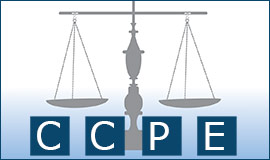Pan-European Conference organised jointly with École Nationale de la Magistrature (Bordeaux)
Conclusions summarised by the Secretariat
The Conference fully endorsed the draft Recommendation on the Role of the Public Prosecution in the Criminal Justice System.
Nevertheless, it proposed the following two amendments:
- Paragraph 5d should make clear that remuneration, retirement age and pension rights should be the same for judges and public prosecutors;
- Paragraphs 5a and 24 (on (i) recruitment, promotion and transfer of public prosecutors and (ii) non-discrimination in the performance of their duties, respectively) should include health and disability among the prohibited grounds for discrimination.
The Conference felt that the strictly criminal field - to which the draft had intentionally been restricted – was too limited and accordingly believed that consideration should subsequently be given to the role of public prosecutors in the civil, commercial and social fields. Furthermore, in order to provide a more effective response to crime, a study should be made of possible action by the public prosecution, in ways yet to be defined, in administrative, tax, customs, financial and other fields.
It was also hoped that the Council of Europe would carry out new activities on the role of the public prosecution outside the traditional criminal field, for example with regard to prevention of delinquency, or what is frequently referred to as urban policy.
Similarly, “crime policy” – the term appearing in the first indent of paragraph 3, and paragraph 21a of the draft recommendation – was a concept which remained inadequately defined – particularly when applied at local level. It therefore warranted further development.
There would also be some value in looking at the public prosecution attached to the courts of cassation. This was an issue in which the Strasbourg court was particularly interested. To this end, it would be necessary to set up a group of specialists.
Lastly, a number of speakers stated that their countries had a code of ethics. The principle was an interesting one in itself and an analysis of what these codes contained would be of great value and could lead to a number of Council of Europe recommendations.
With regard to training, reference was made to the Lisbon network and several speakers expressed the wish for this to be given greater support from the Council of Europe.
Generally speaking, the Conference believed that there would be considerable interest in promoting closer ties and more productive co-operation between the public prosecution in the various countries. To that end, there should be regular meetings along the lines of the Conference. The first aim would be to look at the follow-up to the recommendation once it had been adopted. This would not be incompatible with the proposal in the draft to set up a body specifically assigned to do this between such meetings, and to oversee the tasks listed in the commentary following the explanatory memorandum of the draft recommendation.
The Conference reiterated that the public prosecution was often a hybrid institution, occasionally serving as an interface between the executive and the judiciary; in countries under totalitarian regimes it had been used as a means of oppression and there were very few countries in Europe (both east and west) which had escaped this in the course of the 20th century. Fortunately, these regimes had now disappeared, but the balance between powers remained delicate and it was essential to underscore one of the key roles of the public prosecution – and one which was poorly understood perhaps because it was too infrequently performed – namely guaranteeing individual rights and freedoms under the control of the courts.
Lastly, the Conference also pointed out that one of the features common to all the public prosecutors attending, above and beyond the shared ideals related to the nature of their duties, was the fact that their countries were a Party to the European Convention on Human Rights, which all of them had a duty to apply as interpreted by their courts and the Strasbourg court.
With regard to international co-operation:
The Conference entirely endorsed the recommendations concerning international co-operation set out in the draft under discussion, particularly with regard to the need:
- For public prosecutors to be better acquainted with each other, both personally and professionally,
- To raise public prosecutors’ awareness of the importance of international co-operation in criminal matters;
- To clarify the specific role of the public prosecution in such co-operation.
The Conference pointed out that, on the whole, the recommendations concerning international co-operation in criminal matters included in the draft represented a programme which should be implemented speedily and in a coherent manner.
It also observed that the role of the public prosecution in international co-operation was merely an extension of its role at national level.
The prosecutor’s role in criminal proceedings remained the same even where the proceedings take on an international dimension. Any proceedings under international co-operation are merely a part of the criminal proceedings against an individual.
The rule of law could be guaranteed at trans-national level only by authorities which were both independent and empowered to take initiatives. These two prerogatives were a feature of the public prosecution and explained why the main dynamic role in international co-operation in criminal matters fell to the public prosecutor.
Prosecutors, in particular, were required to ensure that the fundamental rights of the people concerned were upheld. They were also required to ensure:
- That no culture of impunity developed,
- That “European” crime policy was consistently applied,
- That international police co-operation was fully controlled.
To help harmonise the application of conventions in criminal matters and avoid several countries being engaged in the same work in parallel, the Council of Europe should draft a model law on which different countries could draw totally or in part, if they so desired, when drafting or amending their own legislation.
In order to overcome the difficulties caused by the multiplicity of conventions, the Council of Europe should draw up either a “general code for co-operation in criminal matters” or a “convention on the application of conventions in criminal matters”, i.e. a framework Convention.
The need was also felt to co-ordinate all activities carried out in Europe with regard to the production of treaty law and to harmonise practices.
In this connection, reference was made to the relationship between the Council of Europe and the European Union with some speakers talking of the need for greater co-operation between the two organisations, and others stressing the usefulness of building bridges between them.
The European Union’s recent setting up of EUROJUST once again raised the question of whether it was possible to achieve the crime-combating objectives shared by all Council of Europe member States without institutions on a pan-European scale. The Council of Europe should therefore look at whether Eurojust should be enlarged so that all Council of Europe member States could be represented within it, in ways yet to be agreed, or whether a different structure should be set up covering all Council of Europe member States.
In any event, it was essential to put in place arrangements enabling public prosecutors from different member States to contact each other, directly or through liaison facilities, so that their tasks could be successfully carried out. In particular, the current wide gap between (i) the possibilities made available by the multitude of conventions and (ii) their application in practice, could not be filled other than by concerted action by specialist prosecutors co-operating directly beyond physical and bureaucratic frontiers.
Finally, the Conference felt that with regard to international co-operation in criminal matters there was a particularly pressing need for high-ranking prosecutors to meet on a regular basis, at the level of both Greater Europe and its various regions.




